In a move that contradicts the teachings of the Catholic Church, 30 U.S. House Democrats have claimed that their Catholic faith compels them to support abortion. Led by U.S. Rep. Rosa DeLauro and former House Speaker Nancy Pelosi, these lawmakers condemned the Supreme Court’s life-saving decision in Dobbs v. Jackson, stating that their Catholic faith supports a woman’s right to access abortion.
They described themselves as devout Catholics who believe in the dignity of every human being and protecting the most vulnerable. However, they reject pro-life laws that aim to protect the lives of unborn babies. They argue that such laws disproportionately harm marginalized communities and violate the principles of social justice and religious freedom.
Contrary to their claims, pro-life laws have been proven to save lives. Researchers estimate that approximately 25,000 unborn babies have been spared from abortion since the Dobbs decision. Pro-life advocates also ensure that pregnant mothers are protected by the law.
In contrast, Pelosi and most Democrats in Congress support legislation that would legalize abortion for any reason up to birth and force taxpayers to fund these procedures. They argue that allowing individuals to make their own decisions about their bodies, families, and futures aligns with their beliefs as Catholics. However, Catholic Church teachings are clear that abortion is considered evil, as it destroys human life.
While Catholics worldwide are active in the pro-life movement, speaking out for the sanctity of life and advocating for policies that protect unborn babies, some Catholic politicians have tried to justify their pro-abortion views by distorting their faith’s teachings. Pelosi, in particular, has faced criticism from San Francisco Archbishop Salvatore Cordileone, who recently denied her communion in an effort to make her understand the seriousness of her actions.
The stance of U.S. Catholic bishops on denying communion to pro-abortion politicians remains divided, with some welcoming and offering communion to those who support abortion rights without requiring them to repent. This divisive issue continues to stir debate within the Catholic Church.
